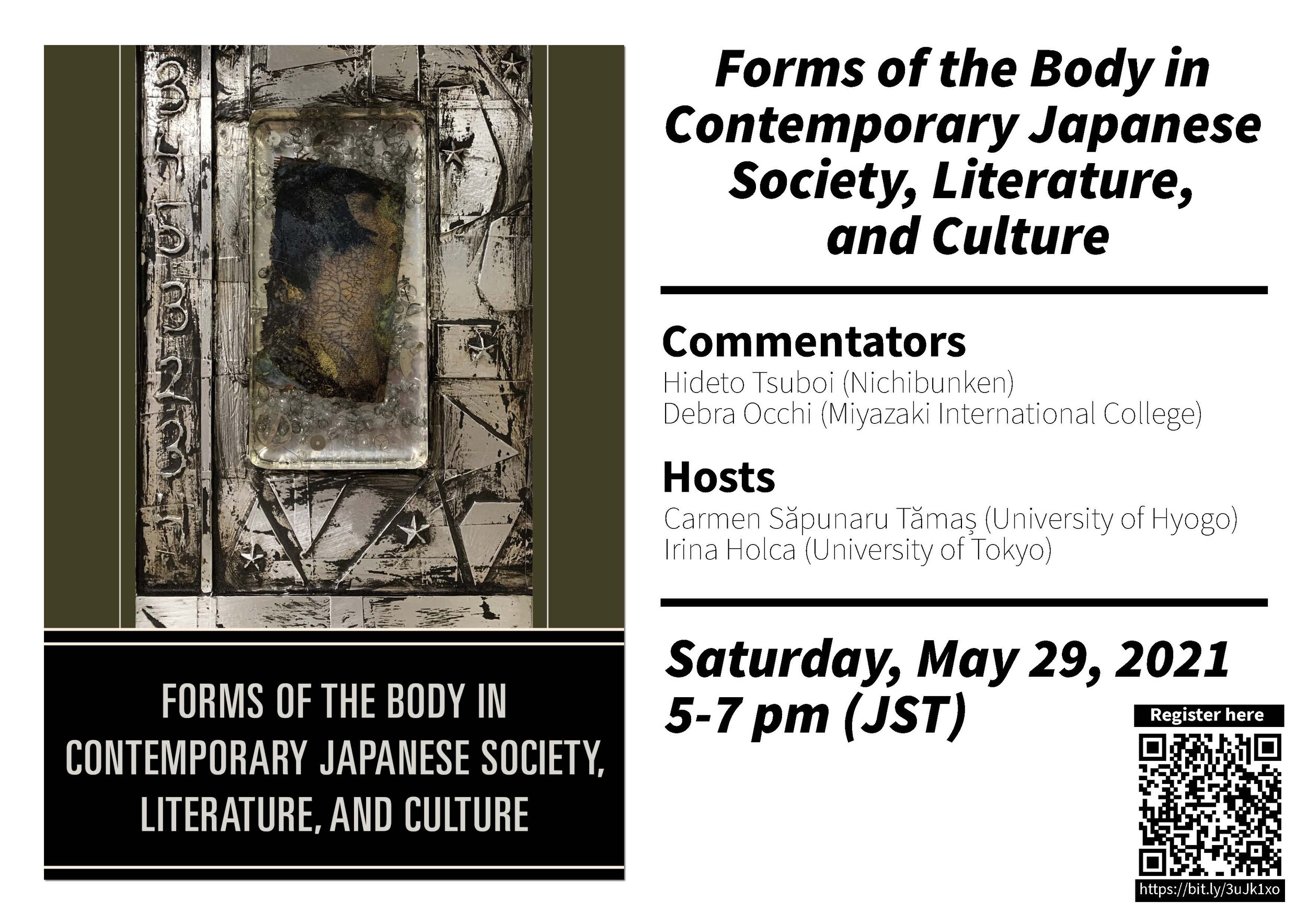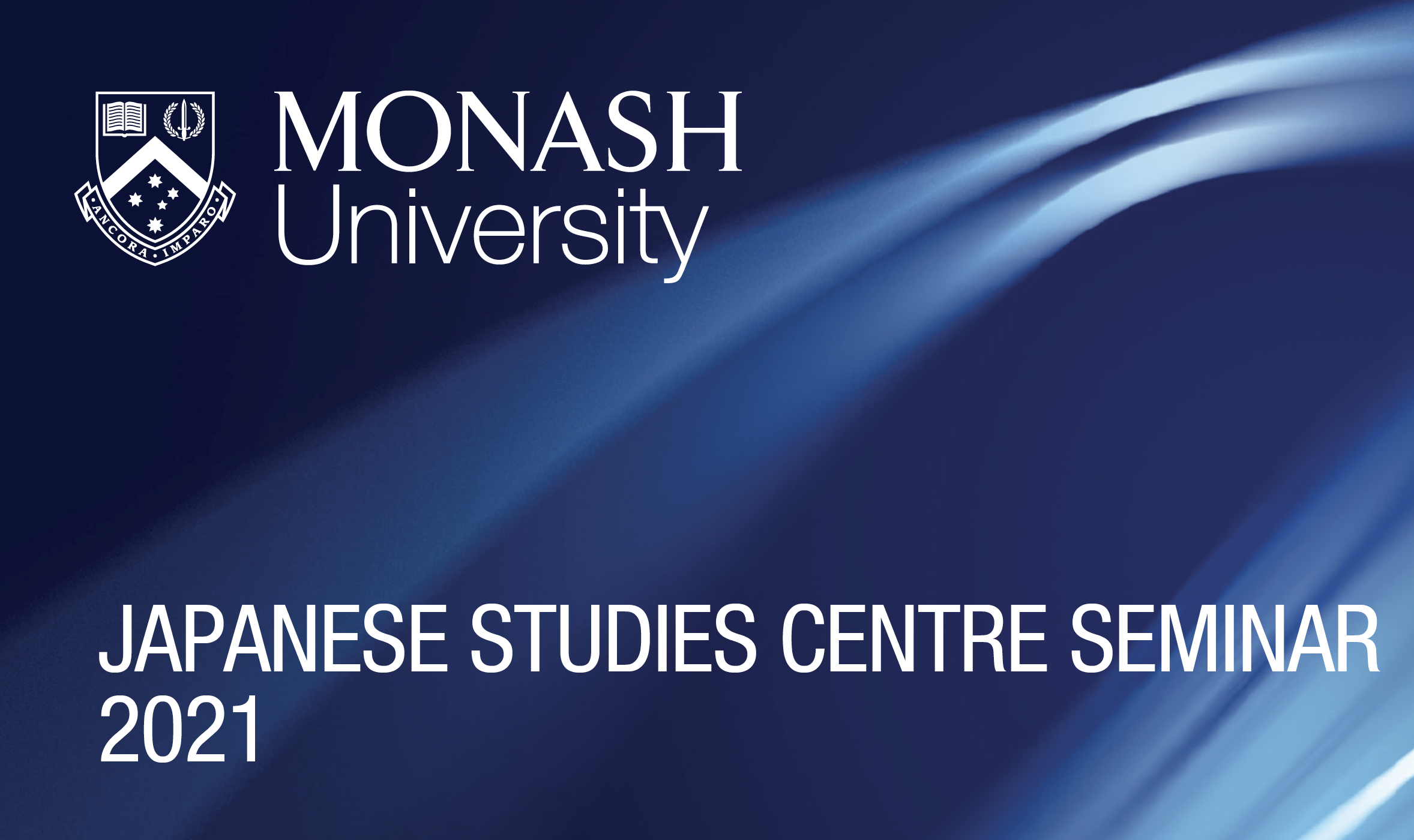
Upcoming events.

Disability in Japan symposium
Please join us for an exciting and intellectually stimulating day of presentations from leading researchers on disability in Japan from Australia, the United States, Europe and Japan. We will also hold the Australian premier of the documentary film, Mark: A Call to Action (dir. Ron Small, 2024) at 3pm.
Speakers include: Carolyn Stevens (Monash University), Nagase Osamu (Ritsumeikan University), Yoshiko Okuyama (University of Hawaii), Naomi Larson (Cornell University), Chris Kai-Jones (Cornell University), Astghik Hovhannisyan (Russian-Armenian University), Ivanka Guillaume (Université Paris Cité) and Anne-Lise Mithout (Université Paris Cité).
Date: Wednesday 23 April
Time: 8:50am - 4:30pm (Melbourne Time)
Location: Japanese Studies Centre, Clayton VIC 3163 & via Zoom
Language: English Registrations: https://forms.gle/Zfy65yVGjjJfku8G7
For enquires please contact Dr Alison Darby Alison.Darby@monash.edu
This event is generously supported by the Japanese Studies Association of Australia.
Masterclass on Conducting Research in Disability Studies
Please join Yoshiko Okuyama (University of Hawaii) for a Masterclass in Conducting Research in Disability Studies, with a special focus on research in an East Asian context.
Date: Thursday 24 April
Time: 9:00am - 11:00am (Melbourne Time)
Location: Japanese Studies Centre, Clayton VIC 3163 & via Zoom
Language: English Registration: https://forms.gle/fUu47WGsSPv1b9eS9
For enquires please contact Dr Alison Darby Alison.Darby@monash.edu
This event is generously supported by the Japanese Studies Association of Australia.

上級日本語Network Online Workshop: Japanese language learning and teaching during COVID-19: What has changed?
Speakers:
Dr Levi Durbidge (University of Sunshine Coast, Australia)
Dr Gwyn McClelland (University of New England, Australia)
Following the presentation by the two speakers, we will have a small group discussion on the theme.
Prior to the COVID-19 crisis, language learning was already undergoing a number of significant changes, including the integration of digital technologies in delivery, increased opportunities for autonomous learning through online affordances and moving beyond a view of students as simply ‘learners’. In our view the coronavirus pandemic accelerated these trends, and we outlined our reflections on this in our 2022 Japanese Studies article Japanese Language Learning and Teaching During COVID-19: Challenges and Opportunities. In the article we reflected on the importance of building learning communities online, the possibilities presented by the digital wilds and the value of self-access learning materials as the roles of students and teachers evolve. With the threat of COVID-19 fading in our collective self-consciousness and a return in many instances to face-to-face teaching, we ask “what (if anything) has changed for Japanese language teaching post COVID-19? In responding to this question we return to a discussion of the trends covered in the article. Has the increased role of digital technology in mediating language teaching affected how Japanese is taught and learnt? Have our perspectives of students and their role in our classes changed? Has the COVID era accelerated neoliberal expectations of language learning and its commodification? Has the availability of online resources for learning Japanese affected what is taught in the classroom? Recognising the diversity of experiences across the 上級日本語ネットワーク we wish to reflect together on these questions and what they mean for Japanese language teaching moving forward.
題名
コロナ禍での日本語教育: 変わったことは?
概要
コロナ禍以前から、言語学習はすでに多くの重大な変化を経ていた。言語教育はデジタル配信との統合、オンラインのアフォーダンスで自律的学習の増加、学生を「学習者」以上の存在として認識することなどが含まれる。私たちは、コロナ禍が以上の傾向を加速させたと考えていて、これに関する考察を2022年の『Japanese Studies』の雑誌記事「Japanese Language Learning and Teaching During COVID-19: Challenges and Opportunities」にまとめた。その記事では、オンラインでの学習コミュニティーの構築の重要性、デジタルワイルドズでの学習可能性、生徒と教師の役割が変更する中でセルフアクセスの学習教材の価値について考察していた。コロナ禍の脅威が我々の意識の中で薄れ、対面授業に戻る場合の中で、「コロナ禍以降、日本語教育にとって何が変わったか」と問いたいと思っている。この質問の答えを導くために、記事で取り上げた傾向をもとに、次のことを考えたいと思う。言語教育を媒介するデジタル技術の増大は、日本語の教え方、学び方に影響を与えたのか。学生に対する見方や授業における学生の役割は変わったのか。言語学習に対するネオリベラリズム的な期待やその商品化を加速させたのか。日本語学習のためのオンライン資料の利用可能性は、教室で教えられることに影響を与えたのか?上級日本語ネットワークでの多様な経験の上で、これらの疑問と、それがこれからの日本語教育にどれぐらい関わってくるか、一緒に考えてみたいと思う。

Gender and Emotion in Japanese Christianity (1549-1638)
Gender and Emotion in Japanese Christianity (1549-1638) CFP

INGS-J Study Session「性にまつわる授業は、学習者の幸せと未来につながる ~日本語学校発の実践から見えるもの~」
SPEAKER: Hideki Hagiwara-sensee, Intercultural Institute of Japan (Teaching Coordinator)
LANGUAGE: Japanese
Message from Hagiwara-sensee:
ここ10年ほど、「生(ライフ)」をキーワードに社会的課題とリンクした日本語授業の実践を続けています。生と死、命、性、戦争、あるいは3.11を中心とした災害全般、そして差別など、日本語教育ではタブー視されがちなテーマに基づく連続授業をまったくの手探りで試みる中で、受講生から前向きで嬉しい反応を得てきました。
そのような一般に避けられやすいテーマのうち、今回は特に「性」に焦点化した授業の具体的な内容の紹介を軸に据えます。それと並行して、実践までの経緯、狙いや意義、受講者の反応、また問題点などをご報告し、参加者の皆さんと性にまつわる授業のあり方や課題を議論できたらと思います。
あくまでも日本語学校での実践例の紹介ですが、ジェンダーやLGBTQ、SOGIESCを学ぶ重要性を踏まえながらも、それに限らない、性にまつわる多様なトピックを扱うことがもたらす質的な豊かさや可能性、希望を見出していただければ幸いです。これらは日本語教育の世界では蓄積に乏しく、過去の実践も単発的で教科書類もマニュアルもないに等しいものですが、それゆえのやりがいもあります。さらには第二言語としての日本語教育だからこその成果、意義もうかがえる…そんな実感と手応えを手にしています。それらから、この会が学習者の幸せ、QOLの向上につながる日本語教育とは何か、日本語教育とはそもそも何なのか…などをあらためて考えてみる機会になったら嬉しいです。
画面越しにはなりますが、関心をお持ちの皆さんとこの貴重な場を共有できることを楽しみにしています。
Date and TIME
17/Dec/2022 (Sat) 20:00-22:00 (EST)
18/Dec/2022 (Sun) 10:00-12:00 (JST)
18/Dec/2022 (Sun) 12:00-14:00 (AEDT)
If you are in a different region, please see this page.
This event is a Zoom event!
REGISTRATION
【Registration】2/Dec/2022 (Fri) 00:00 (JST)~15/Dec/2022 (Thu) 23:59 (JST)
【Registration limit】40 people
【Registration form】https://forms.gle/UeTezLYFyYBSuo6N6
・The guest speaker’s talk will be recorded and published on the INGS-J website for a limited time. The Q&A and discussion will not be recorded.
・ The Zoom link will be sent to your email address on the 16th of December (Fri) (JST).
・If you would like to cancel your registration, please contact us at: ingsjapanese@gamil.com
・This is a free event!
【Contact】ingsjapanese@gmail.com
ORGANIZER
International Network of Gender, Sexuality & Japanese Language Education (INGS-Japanese)
The International Network of Gender, Sexuality & Japanese Language Education (INGS-J) is founded in 2021 by Claire Maree (The University of Melbourne) and Jotaro Arimori (The University of Toronto) aiming to build greater inclusivity for gender and sexual diversity in Japanese language education and learning spaces. INGS-J will foster collaborative intersectionality and queer approaches to language pedagogy and classroom practices. INGS-J will collaborate widely, and internationally to share information and strategies for creating greater inclusivity in Japanese language education for all learners, educators and Japanese language users.

LCNAU Seventh Biennial Colloquium
The Languages and Cultures Network for Australian Universities (LCNAU) wishes to invite you all to take part in the LCNAU Seventh Biennial Colloquium, which will take place at the University of Melbourne.
This year’s event provides us, as academics, scholars and educators, with a timely opportunity to reflect critically on the many changes, challenges and innovations that have occurred during that time, and how they have shaped what we do and who we are. It also provides us with an exciting opportunity to share experiences and to explore where we are heading next and what we can achieve - not just with respect to research and teaching, but also in terms of our contribution to the humanities and social sciences more broadly.
This event is sponsored and supported by the School of Languages and Linguistics, the Asia Institute and the Melbourne Conventions Bureau.
For more information please visit our website

Art-Based Research in Japanese Studies Symposium
Join us for a symposium that explores how arts-based methods can provide new insights into Japanese cultural experience and language through presentations and workshops led by artists and academics.
Organisers: Dr Megan Rose and Dr Sharon Elkind, Vitalities Lab UNSW Sydney
Sponsors: Japanese Studies Association of Australia; UNSW Sydney; Sumida-ward Tourism Association
Date and time
1) Thursday, 29th September 10am-5pm AEST (Day of presentations and workshops)
2) Friday, 30th September 9am-12pm AEST (Associated event)
Location: Event registrants will be emailed directly with the event room and zoom link on the 19th September 2022.
Registration and details: here

JSAA Virtual Conference 2021
Our annual conference will be held online around the theme of ‘Sustainability, Longevity and Mobility’.

Identity and Internment: the Japanese Experience
Just hours after the declaration of war in December 1941, Japanese in Australia were swiftly arrested. The Nikkei community had shrunk to only 1100 people at the outbreak of war, and the majority (almost 98%) were interned in remote camps around Australia.
There, they joined more than 3000 other Japanese civilians who’d been arrested in Allied-controlled countries such as the Dutch East Indies and New Caledonia, and sent to Australia to be interned. Despite being grouped together as “enemy aliens,” the Japanese internees in Australia were extremely diverse and many did not speak the same language.
From February 1946, the majority were repatriated to Japan, many against their will.
Join us for a fascinating look at this history and how it compares to the Japanese Canadian story. For more details and registration, check this page
Speakers: Dr Yuriko Nagata, Dr Christine Piper, Mr Andrew Hasegawa.

Opening Online Event. ‘The Miracle Pine Tree, Rikuzentaka, Japan’ Philip Brophy
Opening lecture for Mutable Ecologies - The Miracle Pine Tree, Rikuzentaka, Japan

Japan Update 2021
Japan Update is the flagship conference of the Australia-Japan Research Centre and the Japan Institute at the Australian National University

Building a Career with Asian Languages
We will explore the professional opportunities available to Asian language majors, then hear from graduates on how their Asian language major shaped their career paths. Afterwards, there will be a Q&A session with the speakers.

INSIDE A FAMILY-RUN UNIVERSITY IN JAPAN
Please join us for what will be an invigorating discussion with one of the most renowned authorities on education in Japan! The Japanese Studies Centre is pleased to welcome Professor Roger Goodman (University of Oxford) as a speaker on the topic of Family-Run Universities in Japan.

Pandemic Pressure Points: Economics, Governance and Society in Japan
This free roundtable discussion brings together an interdisciplinary group of experts to discuss the short- and long-term impact of the COVID-19 pandemic on the Japanese economy, legal system, and wider socio-political regime.

HDR/ECR/Honours Monthly Zoom Hangout
The JSAA runs a monthly virtual hangout for HDRs, Honours students and ECRs from any discipline whose research interests include Japanese studies. It's a very informal group - ultimately a network - wherein we discuss research challenges, achievements, share intel, reading recommendations etc.
All HDRs, ECRs and Honours students are welcome (you do not need to be a member of the JSAA).
We meet via Zoom on the first Friday of each month. Our next meeting is Friday 6 August 14:00 to 15:00 AEST.
Anyone with questions or seeking the Zoom link please email Pepi Ronalds via jsaabulletin@gmail.com.

Forms of the Body in Contemporary Japanese Society, Literature, and Culture
Symposium on Forms of the Body in Contemporary Japanese Society, Literature and Culture with discussions by Hideto Tsuboi (Nichibunken) & Debra Occhi (Miyazaki International College).
Hosts: Carmen Săpunaru Tămaș (University of Hyogo) & Irina Holca (University of Tokyo)
Please register here.

グローバルにつながるオンライン日本語教育シリーズ第4弾
「日本語ユーザー」を目指した日本語教育
オーストラリア・ニュージーランド・シンガポールの高等教育機関における上級日本語教育の現状から
日本語教育における「上級」は、どのように捉えられているのだろうか。そこではどのような実践が行われているのだろうか。アジア・オセアニア地域の大学が連携して立ち上げた「上級日本語ネットワーク」では、このイベントを通じ、上級の実践に関して様々な視点から意見の交換・アイディア共有を図り、日本語教師のサポートネットワークを広げていくことの意義を追求したい。

Japanese Language in Fiction and Translation
Please join us on 7 May for a Japanese Studies Centre webinar featuring Monash PhD Graduate Dr. Hayden Trowell, Monash University's Dr. Satoshi Nambu and Osaka University's Professor Satoshi Kinsui for an event entitled

上級日本語Network Launch Event (Zoom)
We are excited to welcome everyone to the first 上級日本語Network Event. Come along to hear more about the progress the network has made, the new website, and how to stay involved!

Read Japan: A Booklover's Guide to Japanese Literature in Translation, 1960 - Now
In March, The Japan Foundation, Sydney will present a three-part talk series titled 'Read Japan: A Booklover’s Guide to Japanese Literature in Translation, 1960 – Now'.
This talk looks at novels by Natsuo Kirino, Risa Wataya, Mieko Kawakami and Novala Takemoto, as well as rising star Sayaka Murata (of Convenience Store Woman fame).

Samurai Transformed
Organized by the Australasian Network for Asian Art (an4aa) in conjunction with ongoing Art Gallery of South Australia exhibition Samurai (ends March 28, 2021) and the University of Melbourne, this conference will explore the plural images evoked, cultivated, and inspired by the samurai.

Read Japan: A Booklover's Guide to Japanese Literature in Translation, 1960 - Now
In March, The Japan Foundation, Sydney will present a three-part talk series titled 'Read Japan: A Booklover’s Guide to Japanese Literature in Translation, 1960 – Now'.
This talk examines a range of literary works of the 1980s and 1990s and the ways in which they reflected and affected the social transformations of their time.

Read Japan: A Booklover's Guide to Japanese Literature in Translation, 1960 - Now
In March, The Japan Foundation, Sydney will present a three-part talk series titled 'Read Japan: A Booklover’s Guide to Japanese Literature in Translation, 1960 – Now'.
This talk will examine three giants of postwar Japanese literature—Kobo Abe (1924-1993), Yukio Mishima (1925-1970), and Nobel laureate Kenzaburo Oe (b. 1935)—and discuss how they sought to construct a philosophical and moral response to the upheaval and change that engulfed them.
International Women’s Day 2021: Gender, Diversity and Inclusion in Academic and Research Environments in Australia and Japan
In solidarity with International Women’s Day, researchers and practitioners from Australia and Japan will share perspectives on gender, diversity, and inclusion in academic and other environments, in both countries.
国際女性デーに連帯して、オーストラリアと日本の研究者と専門家が、両国の学術研究環境やその他の環境におけるジェンダー、多様性、インクルージョンについて意見交換を行います。
HDR, Honours Student and ECR Virtual Hangout (March)
Join HDRs, Honours Students and ECRs in our monthly virtual hangout.
Japanese Studies Round Table
The Japanese Studies Association of Australia (JSAA) has been funded by The Japan Foundation to complete a report on the state of Japanese Studies in the region. The focus of the report, which is intended as an annual activity will be on these voices from the field over hard statistics.
Online Seminar: A Celebration of Mark McLelland
This memorial roundtable captures some of that richness of Mark McLelland’s (1966-2020) was a pioneering work which has served as an inspiration to so many people in various fields—Japan Studies, Queer Studies, Gender and Sexuality Studies, Cyberculture Studies, and more.
Remembering the ‘Modern Boy’: Gender, Empire, and Nostalgia
Columbia University's Center for Korean Research is pleased to announce the first in a series of three Zoom workshops on the theme of “QUEERING THE STRAITS: UNRULY SUBJECTS ACROSS MODERN KOREAN AND JAPANESE STUDIES” to be held in 2021.
Beyond Japanese Studies Symposium: Challenges, Opportunities And COVID-19
This symposium is designed to respond to challenges, opportunities and needs in the academic landscape which have resulted from, or been intensified by, the effects of COVID-19.
Mutant Urbanism in Japanese Architecture: Lessons from the Metabolist Movement
Learn about one of Japan's most iconic architectural movements.